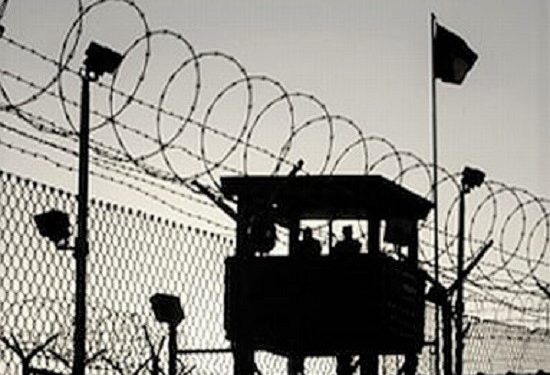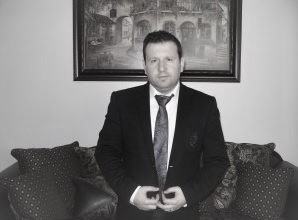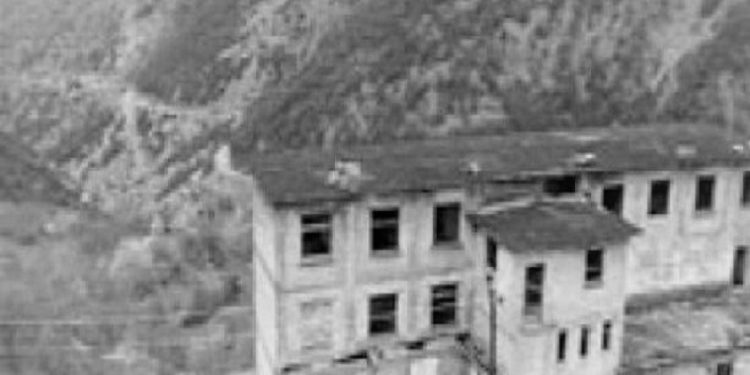By Dhimitër Rrera
Memorie.al / He did not give the impression that he was 50 years old and had spent almost half of his life, 22 years, in the prisons of the communist regime of Enver Hoxha and his successor, Ramiz Alia. Every morning, he appeared in front of the wholesale stores, where he worked as a merchandise distributor, sometimes with a wheelbarrow and sometimes with bags, according to the merchandise ordered, taking out the few ALL to feed his wife and two young children. Brahim Rezvani is one of the victims of the class war of the communist dictatorship regime. He was born in a village in Saranda, Sasaj, somewhere near Borsh and after 22 years of political imprisonment, from Burreli to Spaç, he has long since settled in Berat.
“We were eight children, 3 boys and 5 girls. We lived happily in Tirana, because my father, Abedin Rezvani, was an officer. All of us children were in school and were gradually emerging into life, but just when everything seemed to be going well, all our dreams were cut in half and everything began to fall apart,” says Rizvani.
According to Brahimi, the reason was him, because among his first-year high school friends, he also met Beb Shameta, a former athlete. “I adored Beb for his athlete’s body, but also with the curiosity of a teenager, to get closer to him after he had served 12 years in prison for politics, without knowing that this would cost me a lifetime in prison.”
Now, Brahimi still does not know where his brothers and sisters are, and he has not even managed to correspond with them. “This is the drama of my family with many children and dreams extinguished in the middle by the regime of that time”, he said in an interview, which we are publishing in this article
Mr. Rizvani, what do you remember from that time, when you were sentenced?
It was 1969, when I was in the first year of the “Sami Frashëri” high school in Tirana. I had just known love, I was a good student and I had my dreams for life. While studying, I wanted to become someone. Among the company of my age, I had also met the girl I liked and in the meantime we had started to weave dreams for life, when suddenly everything turned upside down.
As a result of my occasional association with Beb Shamet, (who later tried to escape and was killed by soldiers at the border), the people of the Sigurimi of that time had put me on the list of “victims”, because that is how the Party wanted it.
One fine day, when my friends and I were listening to the teacher’s explanation, in the classroom, two people, Sigurimi officers, entered without knocking. After talking to the teacher, they approached me, approaching the desk.
After asking my name, they immediately put handcuffs on me, telling me: “in the name of the people, you are under arrest.” I remembered that they were joking, since my father was an officer in the Internal Affairs Branch. But, with handcuffs in my hands, I ended up, as they said at the time, in the “Gas” of the Branch and then in the dungeons of the investigation.
As an “opponent and conspirator for agitation and propaganda,” I, a 15-year-old, had to show who I was connected with for the overthrow of the people’s power. Absurdity. I didn’t understand what they were asking of me, but it was too late now, as measures were being taken for all family members, starting with my father’s dismissal from his job as an officer, and the inclusion of my brothers on the list.
Meanwhile, I myself did not know anything about what was happening because I had no way of communicating with my family. The investigators demanded that I speak, or rather, accept and sign everything they had compiled, “for treason against the homeland”. So, I spent the next two years of high school in a dungeon, taking lessons from the investigators and experiencing the most inhuman tortures of that time.
When did you go to trial and how much were you sentenced?
After two years, the investigators took me to court where none of my family was there. At least to see them, since I knew nothing about what had happened to them. However, with the absurd accusation that I had allegedly carried out agitation and propaganda against the communist government, when I was only 15 years old and did not yet know what politics was, I was sentenced by the judges of that time to 15 years in prison.
Apparently, until I turned 17, I was held for two more years in the investigation. I was arrested on February 12 or 13, 1969, and in court, I was released after two years, in 1971. I had begun to understand that, since injustice prevailed, everything was decided for me, I had to spend the best years of my life in prison.
Then, where did they take you to serve your sentence?
To the Ballsh prison, where the Oil Refinery was also being built, but I didn’t go there for long, because no more than 6 months later, I refused to listen to the political information when they read us the works of Enver Hoxha. Then I specifically said: they are for the bathroom, because I had lost patience with the inhumane treatment that was given to the prisoners.
So I ended up back in the dock inside the prison, being given the capital sentence of 25 years. I was immediately transferred to the infamous Burrel prison. I stayed there for 6 years and then I was transferred to the Qafë Bari camp. After a fight with one of the officers, I was transferred again, but this time to Spaç, where I spent about 11 more years.
Shortly before democracy came, we were taken from Spaç and ended up in Shën-Vasi, in Borsh, somewhere near my native village. There I cried a lot because, returning after 27 years, but already tied hand and foot and without freedom, I looked at the sea and could not get enough of it. It was in this very place that the year 1991 came to me, when I managed to regain my freedom, after having lost hope forever. I often cannot believe how the years flew by.
After leaving prison, where did you go?
After leaving prison, I had nowhere to go, as I knew nothing about my people, but with my prison clothes, I fled to Greece where I worked for a year. Then I met a good friend, who also became the reason why I got married, creating my new family at the age of 42 and now I have two sons and live here in Berat. I work when I find a job and we eat.
What did you gain from your time in prison?
I got some securities, which if sold one hundred percent would have been worth about 15 million old lekë. They were sold for 50 percent and so I only got half and built this house with blocks where I live today with all my children. But these marks that I have, (he points to his ankles where the marks of the wounds left by the chains are visible), will never be removed from me until I die.
Rezvan’s painful testimony: “I don’t know anything about my parents, because during prison, I lost my sisters and brothers”!
What has remained a hostage for Brahim Rezvan for the rest of his life is the loss of his family, after his arrest in 1969. He says that he knows nothing, neither about his brothers, nor his sisters, nor about his father. When he was released from prison after 22 years, he found no one to welcome him. “I think I was the one who caused the breakup of my large family, because after my arrest everything went wrong for them,” says Brahimi.
During his years in prison, he learned nothing about them, and none of his relatives were even present in the courtroom during the trial. “I don’t know, but later I learned that my family was exiled to a village whose name I don’t remember, but it’s somewhere behind the Dajti mountain. Two of my brothers were imprisoned. Shkëlqimi, who was sentenced to 12 years in prison and served 19 years, after he was released from prison I don’t know where he ended up, but I still have his photo.”
He also learned that his other brother, Astrit, had suffered the same fate, who was sentenced to 10 years in prison, but later died for a reason that Brahimi never found out. And as for the fate of his sisters, everything remained a mystery. “They have created their own lives and I have no correspondence with them, while my mother died in exile.”
His father, an officer, escaped around 1974-1975 along with the athlete Beb Shameta, who was killed during this attempt. From the information he has learned, Brahimi believes that his father is in Boston, America, but he has not had any contact with him during his son’s 14 years of freedom. Brahimi himself says that his father has not attempted to contact him and yet says that he is somewhat angry with him, after he escaped, while his mother died in poverty.
Prisonmate, with Pjetër Arbnori and Sherif Merdani
While serving his sentence in Burrel prison, Brahimi says that he had roommates, several well-known characters, convicted by the then system for political issues. “For 5 years I stayed in a room with Daut Gumeni, Sherif Merdani, Pjetër Arbnori, Kurt Kola and Adem Allçi. Staying with them, I began to understand what politics was, since they were older than me and knew something more”.
After the first years of the sentence, a revolt took place in this prison in Burrel. Its consequences fell on Brahim and several other convicts, who found themselves in the dock once again. This time for attempting to explode the prison, he was sentenced again from the beginning, to 25 years in prison.
“It was finally decided that I would not get out of prison alive. I even thought that one day I would end up like my fellow sufferers who died, or were shot as we said, in the Qershiza camp, in the roots of which I later learned that when it was dug up, many bones of convicts who died from torture, hard labor or shooting were found.”
Dates
April 6, 1954: Brahim Rezvani, born in the village of Sasaj, Saranda
February 12-13, 1969: Arrested in school “for agitation and propaganda” against the popular government and sentenced twice to 25 years in prison
April 1991: Rezvani is released from prison, after the change of political systems in Albania
22 years in prison: Rezvani served a total of 22 years, entering at the age of 15 and leaving after he turned 37 in various prison cells. Memorie.al













